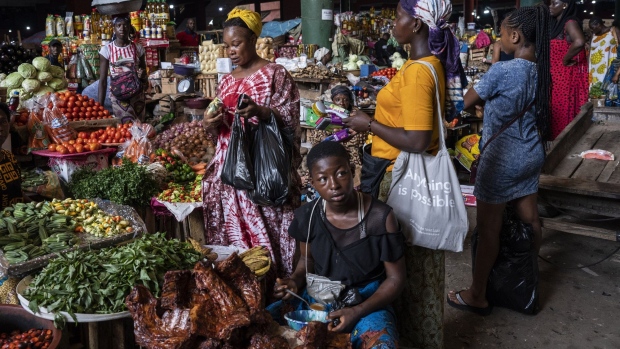Jun 30, 2022
Hunger Gap Rise Threatens Health Security, African Leaders Say
, Bloomberg News

(Bloomberg) -- The economic fallout from the Covid-19 pandemic combined with conflict and climate shocks are driving hunger to unprecedented levels, with African leaders warning that this is raising health risks and cutting access to care.
“Food security is the beginning of health security,” Ahmed Ogwell Ouma, the deputy director of the Africa Centres for Disease Control and Prevention, said at a virtual briefing on Thursday. “When our populations don’t have good nutrition, by and large it means their immunity is reduced and they’re able to get infected by different types of diseases much more easily.”
The number of people facing acute food insecurity worldwide has more than doubled to 345 million since 2019 and as many as 811 million go to bed hungry every night, according to the World Food Programme.
In countries such as Nigeria, South Sudan and Yemen, WFP is already cutting rations to be able to reach more people. Even in South Africa, the continent’s most-developed nation, higher food and fuel prices are crimping household spending on nutritious meals.
“We just hope this thing ends quickly,” said Joe Phaahla, South Africa’s Health Minister, in an interview in Singapore Wednesday. “If it is sustained for up to next year, it will be a crisis for us.”
In eastern Africa, the World Health Organization is scaling up operations as rising international food and fuel prices add to the region’s worst drought in 40 years. In that region alone, more than 80 million people are food insecure and resorting to desperate measures to feed themselves and their families.
The WHO is setting up a hub in Nairobi, from where it will send out medicines needed to treat children who are severely malnourished. The organization is also working with ministries of health in the affected countries to set up robust disease surveillance systems.
“We are at a critical crossroads,” said Dr Ibrahima Socé Fall, WHO Assistant Director-General for Emergency Response. “While the clear priority is to prevent people from starving, we must simultaneously strengthen our health response to prevent disease and save lives.”
©2022 Bloomberg L.P.


